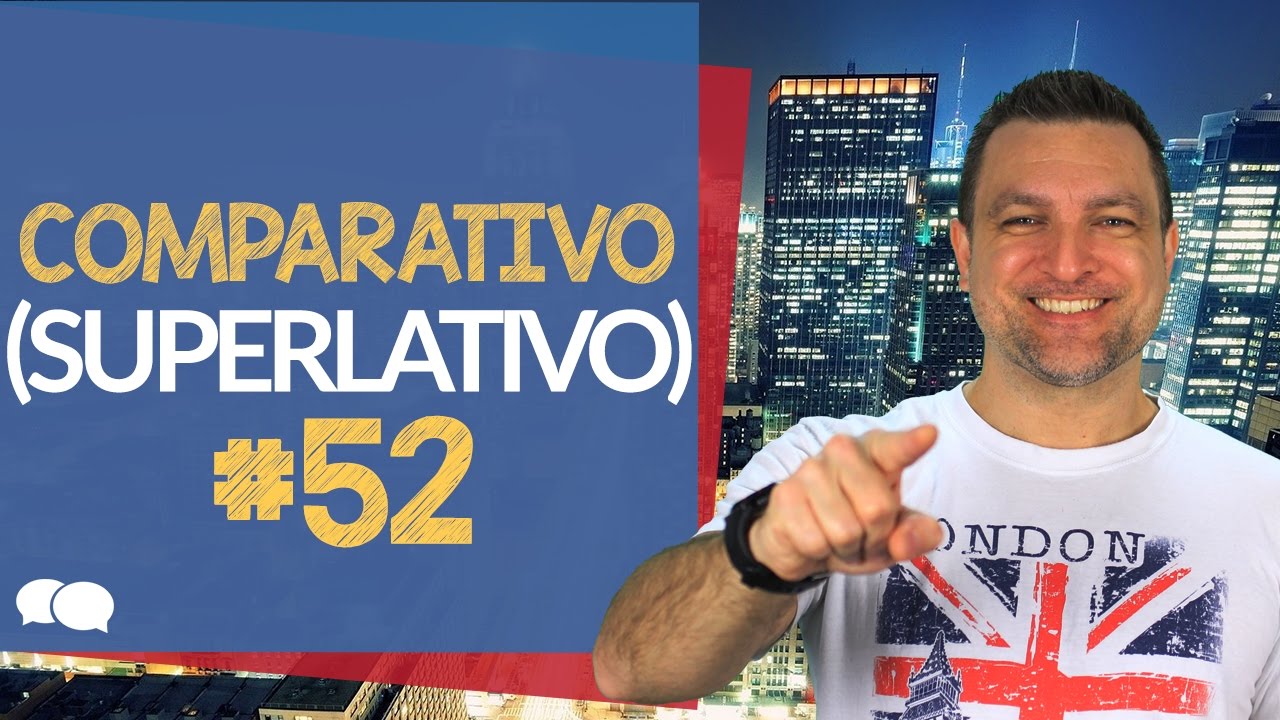Hello friends and welcome back to another post!
Hoje vamos ver como fazer comparação em inglês. Vamos dar uma olhada em cada uma das regras acompanhadas de exemplos de como utilizar. So, let’s get started!
COMPARATIVOS
Terminação ER
Para palavras pequenas, de até duas sílabas, vamos adicionar a terminação ER.
Smart — Inteligente ou esperto
Smarter — Mais inteligente ou mais esperto
Tony is smarter than you. — Tony é mais inteligente do que você.
Cheap — Barato
Cheaper — Mais barato
My house is cheaper than yours. — Minha casa é mais barata do que a sua.
Hot — Quente
Hotter — Mais quente
Yesterday was hotter than today. — Ontem estava mais quente do que hoje.
High — Alto
Higher — Mais alto
I can jump higher than you. — Eu consigo pular mais alto do que você.
Terminação IER
Para palavras com até duas sílabas e terminadas em Y, vamos adicionar a terminação IER.
Funny — Engraçado
Funnier — Mais engraçado
My brother is funnier than you. — Meu irmão é mais engraçado do que você.
Happy — Feliz
Happier — Mais feliz
My mother is always happier than everyone else. — Minha mãe está sempre mais feliz do que todo mundo.
Adição de more
Para palavras com mais de duas sílabas vamos adicionar a palavra more (mais) antes do adjetivo.
Intelligent — Inteligente
I am more intelligent than you. — Eu sou mais inteligente do que você.
Interesting — Interessante
Her book is more interesting than his book. — O livro dela é mais interessante do que o livro dele.
Difficult — Difícil
This test is more difficult than the test we took yesterday. — O teste está mais difícil do que o teste que fizemos ontem.
Jeito alternativo de falar a frase acima.
Hard — Difícil
Harder — Mais difícil
This test is harder than the test we took yesterday. — O teste está mais difícil do que o teste que fizemos ontem.
SUPERLATIVOS
Agora vamos ver superlativos, ou seja, como falar “o mais alguma coisa de todos”.
Terminação EST
Para palavras de até duas sílabas, adicionamos a terminação EST.
Cheap — Barato
The cheapest — O mais barato
This is the cheapest car you can find around here. — Esse é o carro mais barato que você vai encontrar aqui.
Hot — Quente
The hottest — O mais quente
Today is the hottest day of the year. — Hoje é o dia mais quente do ano.
High — Alto
The highest — O mais alto
This is the highest mountain in the world. — Essa é a montanha mais alta do mundo.
Tall — Alto
The tallest — O mais alto
The tallest man in the world. — O homem mais alto do mundo.
Short — Baixo
The shortest — O mais baixo
The shortest person in my family is my sister. — A pessoa mais baixa na minha família é a minha irmã.
Adição da palavra most
Para palavras com mais de duas sílabas, vamos adicionar the most (o mais) antes do adjetivo.
Intelligent — Inteligente
The most intelligent — O mais inteligente
My friend Bob is the most intelligent person I know. — Meu amigo Bob é a pessoa mais inteligente que eu conheço.
Interesting — Interessante
The most interesting — O mais interessante
My history teacher is the most interesting teacher I have. — Meu professor de história é o professor mais interessante que eu tenho.
Boring — Entediante ou chato
The most boring — O mais entediante ou o mais chato
That movie was the most boring movie I have ever seen. — Aquele filme foi o filme mais entediante que eu já vi.
Difficult — Difícil
The most difficult — O mais difícil
I think this is the most difficult job I’ve ever done. — Eu acho que esse é o trabalho mais difícil que eu já fiz.
EXCEÇÕES
Veja algumas exceções que não seguem as regras vistas acima.
Good — Bom
Better — Melhor
The best — O melhor
I felt good yesterday. — Eu me senti bem ontem.
I feel better today. — Eu me sinto melhor hoje.
Today is the best day of my life. — Hoje é o melhor dia da minha vida.
Bad — Ruim
Worse — Pior
The worst — O pior
That soccer team is bad. — Aquele time de futebol é ruim.
Your team is worse than mine. — O seu time é pior do que o meu.
Your team is the worst team in the league. — O seu time é o pior time da liga.
Amigos, ficamos por aqui hoje. Entendeu direitinho como fazer comparação em inglês? Então deixa alguns exemplos aqui nos comentários! Confira também os 15 adjetivos mais utilizados no inglês. Até a próxima!
TRANSCRIÇÃO DO VÍDEO
(O texto a seguir é uma transcrição completa e sem edições do vídeo.)
Remember always: There’s only one person stopping you from getting where you want to get in your life. And that person is you. If you want to change now is the time to change. Not tomorrow, not in a year. There is no time but now. Let today be the day you decide to change your life forever. Forget about what they say. For they don’t know what you are capable of. For they will be the ones asking you the secrets of success later on in life. Hello everyone and welcome back. In this class you will learn… Nesta aula você vai aprender. How to compare people and things. Como comparar pessoas e coisas. So let’s get started. Então vamos começar. Ok. She’s tall. Ela é alta. She’s tall. He’s short. Ele é baixo. He’s short. Maria is taller than John. A Maria é mais alta do que o John. Maria is taller than John. Alto, tall. Mais alto do que, taller than. Baixo, short. Mais baixo do que, shorter than. Very good. Tem regras para isso? Claro que sim. Palavras de uma sílaba ou pequenas você vai adicionar a terminação ER. Como por exemplo. Smart, inteligente ou esperto. Mais inteligente, smarter. Smarter. Cheap, barato. Mais barato, cheaper. Cheap. Cheaper. Hot, quente. Mais quente, hotter. Hot. Hotter. High, alto. Mais alto, higher. High. Higher. Vamos ver alguns exemplos? Smart. Inteligente. Tony is smarter than you. O Tony é mais inteligente do que você. Tony is smarter than you. Cheap. Barato. My house is cheaper than yours. A minha casa é mais barata do que a sua. My house is cheaper than yours. Hot. Quente. Yesterday was hotter than today. Ontem estava mais quente do que hoje. Yesterday was hotter than today. High. Alto. I can jump higher than you. Eu posso pular mais alto do que você. I can jump higher than you. Para palavras que tem duas sílabas e terminam Y vamos substituir o Y por IER. Por exemplo. Funny. Engraçado. Funnier. Mais engraçado. Funny. Funnier. My brother is funnier than you. Meu irmão é mais engraçado do que você. My brother is funnier than you. Happy. Feliz. Happier. Mais feliz. My mother is always happier than everyone else. A minha mãe está sempre mais feliz do que todo mundo. My mother is always happier than everyone else. Agora palavras com duas ou mais sílabas você vai colocar a palavra more na frente. More significa mais. Vamos ver alguns exemplos para que você possa entender melhor. Intelligent. Inteligente. I am more intelligent than you. Eu sou mais inteligente do que você. I am more intelligent than you. Interesting. Interessante. Her book is more interesting than his book. O livro dela é mais interessante do que o livro dele. Her book is more interesting than his book. Difficult. Difícil. This test is more difficult than the test we took yesterday. Este teste é mais difícil do que o teste que tomamos ontem. This test is more difficult than the test we took yesterday. Uma observação. A palavra hard também pode significar difícil, e por ser uma palavra de uma sílaba só, para falarmos mais difícil usaríamos a terminação ER que ficaria harder. Mais difícil. Veja a diferença entre as frases utilizando o exemplo anterior. This test is more difficult than the test we took yesterday. Esse teste é mais difícil do que o teste que tomamos ontem. This test is harder than the test we took yesterday. O que significa a mesma coisa. Muito bem. Agora vamos ver como se fala o maior de todos, o melhor de todos, o mais difícil de todos. Para palavras com uma sílaba vamos colocar a terminação est. Por exemplo. Cheap. Barato. The cheapest. O mais barato. Cheap. The cheapest. Example. This is the cheapest car you can find around here. Este é o carro mais barato que você pode encontrar por aqui. This is the cheapest car you can find around here. Hot. Quente. The hottest. O mais quente. Hot. The hottest. Today is the hottest day of the year. Hoje é o dia mais quente do ano. Today is the hottest day of the year. High. Alto. The highest. O mais alto. High. The highest. This is the highest mountain in the world. Essa é a montanha mais alta do mundo. This is the highest mountain in the world. Tall. Alto. The tallest. O mais alto. Tall. The tallest. The tallest man in the world. O homem mais alto do mundo. The tallest man in the world. Short. Baixo. The shortest. O mais baixo. Short. The shortest. The shortest person in my family is my sister. A pessoa mais baixa na minha família é a minha irmã. The shortest person in my family is my sister. Agora palavras com duas, três ou mais sílabas. Vamos colocar a palavra most na frente da palavra. Por exemplo. Intelligent. Inteligente. The most intelligent. O mais inteligente. Intelligent. The most intelligent. My friend Bob is the most intelligent person I know. Meu amigo Bob é a pessoa mais inteligente que conheço. My friend Bob is the most intelligent person I know. Interesting. Interessante. The most interesting. O mais interessante. My history teacher is the most interesting teacher I have. Meu professor de história é o professor mais interessante que eu tenho. My history teacher is the most interesting teacher I have. Boring. Chato ou entediante. The most boring. O mais chato. That movie was the most boring movie I have ever seen. Aquele filme foi o filme mais chato que eu já vi. That movie was the most boring movie I have ever seen. Difficult. Difícil. The most difficult. O mais difícil. I think this is the most difficult job I’ve ever done. Eu acho que esse é o trabalho mais difícil que eu já fiz. I think this is the most difficult job I’ve ever done. Agora vamos ver algumas exceções muito importantes. São estas: Good. Bom. Better. Melhor. The best. O melhor. Good. Better. The best. Bad. Ruim. Worse. Pior. The worst. O pior. Bad. Worse. The worst. Let’s see some examples of that. Vamos ver alguns exemplos disso. I felt good yesterday. Eu me senti bem ontem. I felt good yesterday. I feel better today. Eu me sinto melhor hoje. I feel better today. Today is the best day of my life. Hoje é o melhor dia da minha vida. Today is the best day of my life. That soccer team is bad. Aquele time de futebol é ruim. That soccer team is bad. Your team is worse than mine. O seu time é pior do que o meu. Your team is worse than mine. Your team is the worst team in the league. O seu time é o pior time da liga. Your team is the worst team in the league. Don’t forget these excaptions. They are very important. Não esqueça essas exceções. Elas são muito importantes. Thanks for watching, and as usual, I’ll see you next class.


